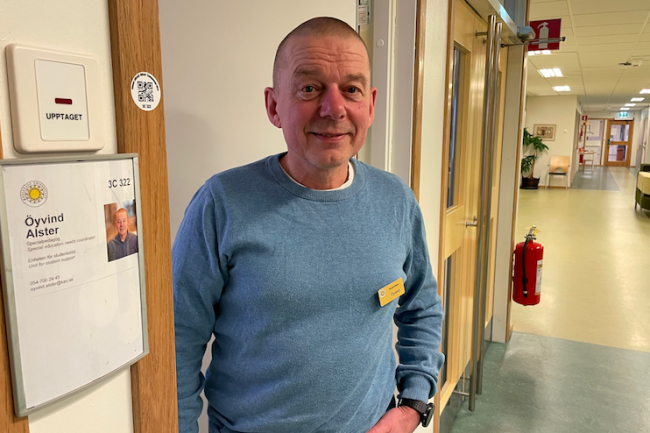Special educational needs co-ordinator Öyvind Alster meets four students per day on average
2024-02-06Öyvind Alster has been working as a special educational needs co-ordinator at the Student Health Services since this autumn.
– The students have found their way to me and book appointments. On average, I have four appointments a day, says Öyvind, who will speak at the next Pedagogical café organised by the Centre for Teaching and Learning (UPE) on Monday 12 February.
Together with teacher Gunnar Olsson he will talk about accessible teaching environments.
– I will talk about students with ADHD, autism, and reading and writing difficulties, the difficulties that these groups struggle with and what we can do together to help them. I also hope that it will turn into an open discussion where we exchange ideas and experiences, says Öyvind Alster.
– I will also cover simple things like the importance of using a microphone when you’re teaching in a lecture hall. To not ask if the students want a break after 45 minutes, but simply take a break. And to not let the students themselves create groups when there are group assignments, but that the teacher divides the students into groups. Otherwise, students with, for example, autism, might not find a group to join.
Öyvind Alster has extensive experience of working with people with neuropsychiatric disabilities and special needs. Before coming to Karlstad University, he worked at Kristinehamn Folk High School as a vocational teacher and special educational needs co-ordinator for 20 years.
– Special educational needs co-ordinators are a natural part of compulsory school and upper secondary school. But it is an unusual function in higher education. My position here at Karlstad University, which is a one-year project employment, is new. Lund University has a special educational needs co-ordinator and the University of Borås is in the midst of appointing one.
There is no doubt that there is a need for special educational needs co-ordinators.
– This is connected to the fact that more and more people with neuropsychological impairments qualify for university studies. As an example, study support services at Karlstad University has seen a 300 percent increase in applications over the past years, and in addition to these students, there are others with special needs that I try to help.
Öyvind Alster describes his role as consisting of three parts.
– First and foremost, I’m here to offer support and guidance to the students who book appointments with me. But I’m also an available resource for teachers as well as UPE in their development of courses and programmes. The two latter include long processes. The first part has been up and running since I started. The students find their way to me and book appointments.
Is it possible to build on the twelve years of experience that the students have acquired from compulsory school and upper secondary school?
– Both yes and no. Many of them have good strategies for dealing with their difficulties, but it may be that these strategies no longer work when they reach university. I usually start my sessions with some standard questions. With students who are in their early 20s, I usually start by asking how they did in upper secondary school, while with students who are a little older and who haven’t studied for a while, I usually start by asking them to describe their current situation.
– Meeting with the students is crucial to find out what the problem is. Are we dealing with something specific to the actual studies or is it more of a personal problem? It can be about me giving advice on how to move forward or me suggesting something concrete that they can try until we meet next time. It makes for very interesting conversations, says Öyvind Alster, who is hoping to meet with more teachers as well.
– Anyone is welcome to contact me via email to discuss anything from me coming to visit and talk about my role as a special educational needs co-ordinator, to discussing specific matters.
Contact details for Öyvind Alster:
More information about the pedagogical café 12 February:


